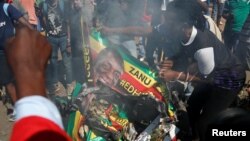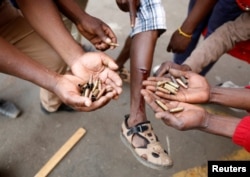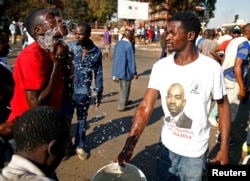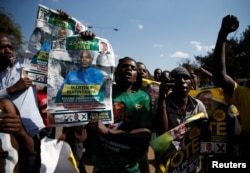Zimbabwe waited Thursday for the results of its presidential election, a day after security forces clashed with protesters who were demanding to know who will be the country’s next leader.
The voting took place Monday and election officials were expected to have results by Wednesday, but they delayed the release at least one more day.
In the capital, Harare, the clashes between protesters and police left three people dead and afterward authorities invoked a law formally calling on the army to help maintain order.
President Emmerson Mnangagwa called Thursday for an independent investigation of the violence while stressing the need for the nation to move forward together.
“We believe in transparency and accountability, and those responsible should be identified and brought to justice,” he wrote on Twitter. “It is also more important than ever that we are united and commit to settling our differences peacefully and respectfully, and within the confines of the law.”
Mnangagwa said his government has been in communication with opposition leader Nelson Chamisa to discuss ways to “immediately diffuse the situation.”
WATCH: Protesters, Security Forces Clash as Zimbabwe Election Results Delayed
Chamisa and his opposition Movement for Democratic Change party have alleged cheating in the election and say Chamisa won the vote.
Results from parliamentary races have been announced, with the ruling ZANU-PF party winning a majority in that body.ZANU-PF is the party of longtime ruler Robert Mugabe who stepped down under pressure from the military in November, and the parliamentary result could signal a strong showing for Mnangagwa.
Election office protests
Wednesday’s violence happened after about 150 demonstrators gathered outside the offices of the Zimbabwe Electoral Commission (ZEC). Police tried to disperse the protesters using water cannon and tear gas. Protesters threw rocks in their direction and started fires in the street.
Then the army appeared, in armored personnel carriers on Harare’s main boulevard, and overhead in a helicopter. VOA saw five armored vehicles with mounted high-caliber weapons, navigating around large rocks that littered the road. Gunfire echoed in the distance.
VOA saw three soldiers beating a young man with batons; other witnesses reported seeing one man shot dead and a woman face-down on the pavement, a bullet hole in the middle of her back.
Protesters did not give their names, but had plenty to say.
“You see, they are using military! How can a general be a president? That government is full of military personnel!” shouted one young man.
Chamisa’s spokesman, Nkululeko Sibanda, rejected an accusation from Mnangagwa that the opposition was responsible for the violence.
“President Nelson Chamisa has not ordered any guns on the street. So he cannot be accused of being violent, because he has put no guns on the street,” Sibanda said.
He said the opposition has serious doubts about official results that show the ruling ZANU-PF party is winning control of parliament and has suspicions about the delay in the presidential results.
“How do we have results from a place that has no telephone line first before we have results from Harare central?” he said. Harare is an opposition stronghold.
Inside the headquarters of ZEC, international observers aired their concerns, with the EU and American observer missions voicing worry over “subtle intimidation” ahead of the vote and noting that the longer the results take, the more tense this wounded nation will be.
Former Ethiopian prime minister Hailemariam Desalegn urged ZEC to conclude the electoral process “in a speedy manner in accordance with the law.
“We also urge other stakeholders, particularly political party leaders and their supporters, to continue to maintain peace and refrain from acts that might undermine the integrity of the process or threaten the peace and stability of the country.”
Mnangagwa has promised to restore the nation’s fractured international relations.
Difference for Zimbabwe
U.S. Democratic Rep. Karen Bass, who is in Harare, says this election could make a difference in Zimbabwe.
“Shortly before coming here, we passed out of the House of Representatives a resolution really calling on the Zimbabwean people to have a peaceful, transparent and fair election, and raising the possibility of evaluating U.S. policy. So that hangs in the air,” she said.



